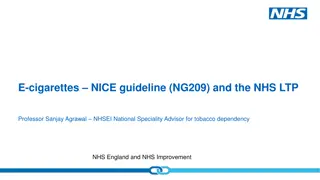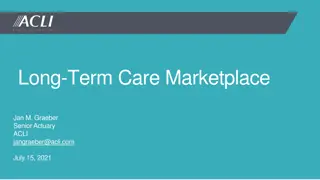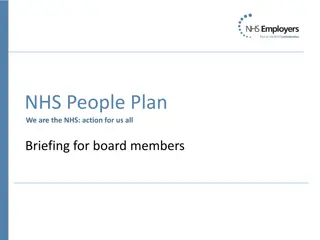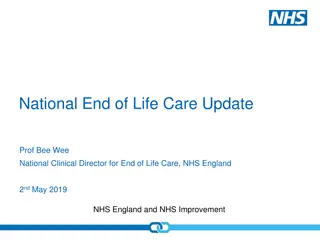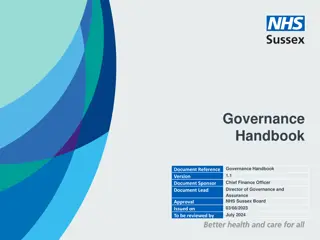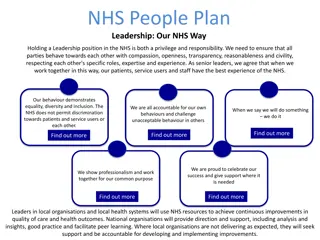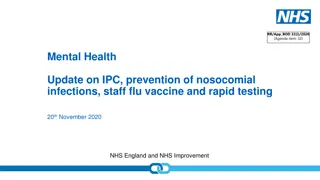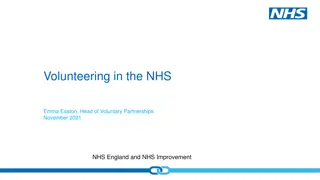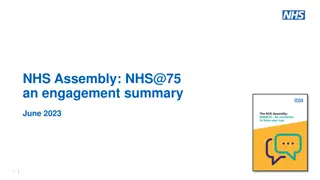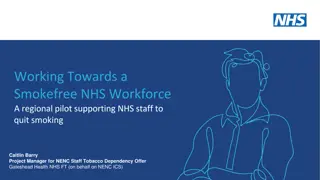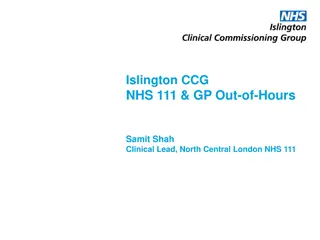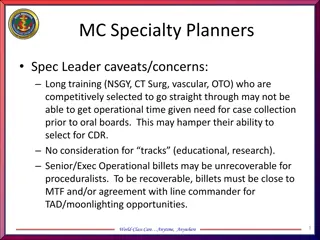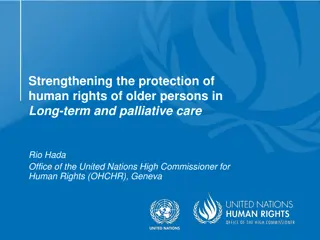Overview of NHS Long Term Plan and Operational Guidance
NHS Long Term Plan outlines healthcare priorities for the next decade, with operational guidance for NHS trusts, foundation trusts, and CCGs. Focus areas include boosting out-of-hospital care, redesigning emergency services, personalized care, digital healthcare, and integrated care systems. Increased investment in primary and community health services aims to enhance patient care and access through new programs and funding allocations.
Uploaded on Sep 11, 2024 | 3 Views
Download Presentation

Please find below an Image/Link to download the presentation.
The content on the website is provided AS IS for your information and personal use only. It may not be sold, licensed, or shared on other websites without obtaining consent from the author. Download presentation by click this link. If you encounter any issues during the download, it is possible that the publisher has removed the file from their server.
E N D
Presentation Transcript
Read and delete this slide Questions or comments on this presentation can be addressed to services.team@psnc.org.uk You can pick and choose the elements of the presentation that suit the needs of your event/discussion Documents summarising the NHS Long Term Plan, NHS Operational and Contracting Guidance and GP contract reform can be found at: psnc.org.uk Last updated: February 2019
NHS Long Term Plan NHS Operational and Contracting Guidance 5-year framework for GP contract reform
Introduction In January 2018, NHS England published the Long Term Plan setting out healthcare priorities over the next 10 years For 2019/20, every NHS trust, NHS foundation trust and Clinical Commissioning Group (CCG), will need to agree organisation-level operational plans which combine to form a coherent system-level operating plan NHS England and NHS Improvement subsequently published NHS Operational and Contracting Guidance 2019/20, which sets out system planning expectations, the financial settlement, full operational plan requirements and the process and timescales around the submission of plans
A new model for the 21st century The five major practical changes to the NHS service model over the next five years will be: 1. Boosting out of hospital care to dissolve the divide between primary and community health services 2. Redesigning and reducing pressure on emergency hospital services 3. More personalised care to help people gain more control over their health when they need it 4. Digitally-enabled primary and outpatient care 5. Increasing focus on population health and local partnerships through Integrated Care Systems
Primary & community health services Commitment to increase investment in primary medical and community health services across the five years from 2019/20 to 2023/24 further supplemented by CCGs and Integrated Care Systems (ICSs) Funding will cover demand pressures, workforce expansion and new services to meet goals 4.5 billion to fund expansion of primary care networks NHS 111 to book GP appointments and refer to pharmacy for self-care Pharmacy Connection Schemes for patients who don t need primary medical services Changes to GP Quality and Outcomes Framework and review of GP vaccination and immunisation standards More support to all care home residents in line with the Enhanced Health in Care Homes model with pharmacist-led reviews
Redesigning & reducing pressure on emergency hospital services NHS will embed a single multidisciplinary Clinical Assessment Service (CAS) within integrated NHS 111, ambulance dispatch and GP out of hours services from 2019/20 Implementation of the Urgent Treatment Centre (UTC) model, with the option of booking through NHS 111 UTCs will work with HCPs, including community pharmacists, to provide local alternatives to A&E for patients who do not need to attend hospital Continued improvements to getting people home without unnecessary delay when they are ready to leave hospital to prevent harm
Improved personalised care This will start with diabetes prevention and management, asthma and respiratory conditions, maternity and parenting support, and online therapies for common mental health problems Through social prescribing, the range of support available to people will widen, diversify and become accessible across the country Link workers within PCNs will work with people to develop tailored plans and connect them to local groups and support services Over 1,000 trained social prescribing link workers will be in place by the end of 2020/21 rising further by 2023/24, with the aim that over 900,000 people can be referred to social prescribing schemes
Digitally-enabled primary and outpatient care A digital NHS front door through the NHS App will provide advice, check symptoms and connect people with healthcare professionals including through telephone and video consultations Patients will be able to access virtual services alongside face-to-face services via a computer or smart phone As technology advances, the NHS will also trial the use of innovative devices such as smart inhalers for better patient care and remote monitoring of conditions Over the next five years every patient in England will have a new right to choose the option of having digital-first contact through telephone or online consultations usually from their own practice or, if they prefer, from one of the new digital GP providers
Population health and local partnerships By April 2021, ICSs will cover the whole country, growing out of Sustainability and Transformation Partnerships (STPs) Every ICS will enable a single set of commissioning decisions at system level; this will typically involve a single CCG for each ICS area CCGs will become more strategic to support providers to partner with local government and other community organisations on population health, service redesign and Long Term Plan implementation New developments: a new Integrated Care Provider contract and a new ICS accountability and performance framework The Better Care Fund will now be reviewed by NHS England, the Department of Health and Social Care (DHSC) and the Ministry of Housing, Communities and Local Government
NHS action on prevention and health inequalities The plan sets out new commitments for action that the NHS itself will take to improve prevention whilst recognising the responsibility of individuals, companies, communities and Government. Action by the NHS is a complement to, but cannot be a substitute for, the role of local government
Prevention & health inequalities - smoking All people in contact with NHS services will be supported to quit smoking By 2023/24, all patients admitted to hospital who smoke will be offered NHS treatments New support for expectant mothers, their partners with a new smoke-free pregnancy pathway including focused sessions and treatments New universal smoking cessation offer to be available for long-term users of specialist mental health, and in learning disability services
Prevention & health inequalities - obesity NHS will provide a targeted support offer and access to weight management services in primary care for people with a diagnosis of type 2 diabetes or hypertension with a BMI of 30+ NHS is also committing to funding a doubling of the NHS Diabetes Prevention Programme over the next five years, including a new digital option to widen patient choice and target inequality NHS will also test a programme supporting very low calorie diets for obese people with type 2 diabetes
Prevention & health inequalities antimicrobial resistance NHS will continue to support implementation and delivery of the government s new five-year action plan on antimicrobial resistance
Stronger NHS action on health inequalities NHS will continue to target funding towards geographies with high health inequalities, worth over 1 billion by 2023/24 Carers will continue to be identified and supported, particularly those from vulnerable communities NHS will ensure that more carers understand the out-of-hours options available to them and have appropriate backup support in place for when they need it Up to 100,000 carers will benefit from contingency planning conversations and have their plans included in Summary Care Records
Further progress on care quality & outcomes NHS Long Term Plan needs to stick with and make further advances on the current NHS improvement agenda for cancer, mental health, multimorbidity and healthy ageing including dementia, while intensifying the NHS focus on children s health, cardiovascular and respiratory conditions, and learning disability and autism, amongst others
Better care for major health conditions Top 5 causes of early death in England are: heart disease and stroke cancer respiratory conditions dementias self-harm The NHS has used these findings to help frame the improvement priorities in the plan
Cardiovascular disease Working with Local Authorities and Public Health England, the NHS will improve the effectiveness of approaches such as the NHS Health Check, rapidly treating those identified with high-risk conditions Working with voluntary sector partners, community pharmacists and GP practices will also provide further opportunities for the public Where individuals are identified with high risk conditions, appropriate preventative treatments will be offered in a timely way The NHS will support pharmacists and nurses in PCNs to case find and treat people with high-risk conditions The creation of a national cardiovascular prevention audit for primary care will also support continuous clinical improvement
Respiratory disease NHS will do more to detect and diagnose respiratory problems earlier From 2019 the NHS will build on the existing NHS RightCare programme to reduce variation in the quality of spirometry testing PCNs will support the diagnosis of respiratory conditions; more staff in primary care will be trained to provide specialist input More to support to those with respiratory disease to receive and use the right medication Pharmacists in PCNs will undertake a range of medicine reviews, including educating patients on the correct use of inhalers and contributing to multidisciplinary working. They can also support patients to reduce the use of short acting bronchodilator inhalers and switch to dry powder inhalers where appropriate and support uptake of new smart inhalers, as clinically indicated
New workforce plan The funding available for additional investment in the workforce, in the form of training, education and continuing professional development through the Health Education England budget has yet to be set by government A workforce implementation plan will be published later in 2019 NHS Improvement, HEE and NHS England will establish a national workforce group to ensure workforce actions agreed are delivered quickly
Expanding staff numbers The funding for the new PCNs will be used to substantially expand the number of clinical pharmacists working in general practices and other environments, such as care homes In community pharmacy, the NHS will work with government to make greater use of community pharmacists skills and opportunities to engage patients, while also exploring further efficiencies through reform of reimbursement and wider supply arrangements
Digitally-enabled care will go mainstream across the NHS High quality NHS information and digital services available through the transformed nhs.uk website National roll-out of the NHS App has begun, which will provide citizens with access to NHS111 online, their GP record and to book appointments The Local Health and Care Record programme has started the work to create integrated care records across GPs, hospitals, community services and social care
Empowering people NHS Apps Library, NHS App and NHS login will enable easy access to personalised content and digital tools and services. The app will work seamlessly with other services at national and local levels and, where appropriate, be integrated into patient pathways Support for people with long-term conditions will be improved by interoperability of data, mobile monitoring devices and the use of connected home technologies over the next few years By 2020, every patient with a long-term condition will have access to their health record through SCR accessed via the NHS App By 2023, the SCR functionality will be moved to the Personal Health Records (PHRs) held within the Local Health and Care Record systems, which will be able to send reminders and alerts directly to the patient. PHRs will hold a care plan that incorporates information added by the patient themselves, or their authorised carer
Supporting clinical care Patients, clinicians and the carers working with them will have a digital service for managing their interactions with the NHS, a view of their record, care plan, expectations, appointments and medications, to enable care to be designed and delivered in the place that is most appropriate for them Using digital services, patients will be able to connect with local services, get an appointment with an urgent treatment centre, out of hours services or GP, or be prescribed medicine to be collected from their nearest pharmacy
Improving population health During 2019, the NHS will deploy population health management solutions to support ICSs to understand the areas of greatest health need and match NHS services to meet them Over the coming years these solutions will become increasingly sophisticated in identifying those groups of people who are at risk of adverse health outcomes and predict which individuals are most likely to benefit from different health and care interventions, as well as shining a light on health inequalities
Maximising taxpayer investment Despite overall efficiency, there is still waste and an opportunity to improve Up to 10% of hospital admissions in the elderly are medicines-related, so pharmacists will routinely work in general practice helping to relieve pressure on GPs and supporting care homes 50% of patients don t take medicines as intended and pharmacists will support patients to get the best from medicines NHS will reduce the prescribing of low clinical value medicines and items which are readily available over the counter to save over 200 million a year Supported by agreed measures to manage branded health service medicines through the new statutory and voluntary pricing and access schemes A new Patient Safety Incident Management System will replace the current NRLS by 2020
Next steps 2019/20 will be a transition year, with every NHS trust, foundation trust and CCG expected to agree single year organisational operating plans and contribute to a single year local health system-level plan ICSs will be central to the delivery of the Long Term Plan and by April 2021, NHS England wants ICSs covering all of the country. As local systems are in different states of readiness, the NHS will support each developing system to produce and implement a clear development plan and timetable The NHS Assembly will bring together a range of organisations and individuals at regular intervals, to advise the boards of NHS England and NHS Improvement as part of the guiding coalition to implement this Long Term Plan Assembly membership will bring insight and frontline experience to the forum where stakeholders discuss and oversee progress on the Long Term Plan
NHS Operational and Contracting Guidance This guidance document focusses on set priorities identified by NHS England (published in the Long Term Plan), system controls and efficiency The NHS guidance stipulates a single operational planning process for commissioners and providers, with clear accountabilities and roles at national, regional, system and organisational level
System planning For 2019/20, every NHS Trust, NHS Foundation Trust and Clinical Commissioning Group (CCG), will need to agree organisation-level operational plans which combine to form a coherent system-level operating plan which is submitted by early April 2019 This will provide the starting point for every STP and ICS to develop five-year Long Term Plan implementation plans, covering the period to 2023/24; these plans need to be agreed by Autumn 2019 The organisations within each STP/ICS will be expected to take collective responsibility for the delivery of their system operating plan, working together to ensure best use of their collective resources
Primary care & community health services STPs/ICSs must include a primary care strategy as part of the system strategy that will be developed by Autumn 2019 in response to the Long Term Plan Strategy needs to set out how they will ensure the sustainability and transformation of primary care and general practice as part of their overarching strategy to improve population health and which engages CCGs and primary care providers in its implementation This must include specific details of their: local investment in transformation with the local priorities identified for support; PCN development plan; and local workforce plan which supports the development of an expanded workforce and multidisciplinary teams and sets out the strategy to recruit and retain staff within primary care and general practice.
Longer-term deliverables A number of areas relating to long-term transformation, and detailed in the Long Term Plan, will require consideration and preparation during 2019/20. Key elements include: System architecture Health inequalities Work towards every area of the country being part of an ICS by April 2021. All local health systems will be expected to set out during 2019 how they will specificallyreduce health inequalitiesby 2023/24 and 2028/29. Offer all women who smoke during their pregnancy, specialist smoking cessationsupportto help them quit. Maternity digital care records are being offered to 20,000 eligible women in 20 acceleratorsites acrossEngland, rising to 100,000 by October2019. Maternity Mental health By 2020/21, the NHS will ensure that at least 280,000 people living with severe mentalhealth problemshave their physical health needs met. Learning autism disability and Expand the STOMP-STAMP programmes to stop the overmedication of people with a learning disability,autism or both by 2023/24. Cancer From September 2019, all boys aged 12 and 13 will be offered vaccination against HPV-related diseases,such as oral, throatand anal cancer. Extend lung health checks(already piloted in Manchesterand Liverpool).
PSNC resources PSNC website The Healthcare Landscape section PSNC Briefing 002/19: A summary of the NHS Long Term Plan (January 2019) PSNC Briefing 006/19: A summary of the NHS Operational and Contracting Guidance 2019/20 (January 2019)
System development By April 2021, NHS England wants ICSs covering all of the country The NHS Assembly will bring together a range of organisations and individuals at regular intervals, to advise the boards of NHS England and NHS Improvement as part of the guiding coalition to implement the LTP NHS England Integrated Pharmacy & Medicines Optimisation (IPMO) pilots likely to roll out across the whole country
System planning For 2019/20, every NHS Trust, NHS Foundation Trust and CCG, will need to agree organisation-level operational plans which combine to form a coherent system-level operating plan, by early April 2019 Every STP and ICS to develop five-year Long Term Plan implementation plans, covering the period to 2023/24, by Autumn 2019 The organisations within each STP/ICS will be expected to take collective responsibility for the delivery of their system operating plan, working together to ensure best use of their collective resources
Primary care & community health services STPs/ICSs must include a primary care strategy as part of the system strategy that will be developed by Autumn 2019 in response to the Long Term Plan Strategy needs to set out how they will ensure the sustainability and transformation of primary care and general practice as part of their overarching strategy to improve population health and which engages CCGs and primary care providers in its implementation
Primary care GP to Pharmacy DMIRS pilots Review of GP vac and imms standards, funding and procurement
Urgent care NHS 111 to book GP appointments and refer to pharmacy for self-care DMIRS rollout Implementation of the Urgent Treatment Centre (UTC) model, which will work with HCPs, including community pharmacy, to provide local alternatives to A&E
Primary Care Networks 4.5 billion to fund expansion of primary care networks - they are about provision of services not commissioning, and they are not new organisations Network Contract DES to drive GP practice involvement They are going to happen we need community pharmacy to be fully involved
Primary Care Networks PCNs will include an increase in the number of clinical pharmacists aim = 1 per practice Can CPs employ/provide clinical pharmacists to the PCN? Medication review and optimisation service to start in 2020/21 clinical review of patients medication, focused on priority groups, e.g. asthma/COPD, LD, frail elderly and care home patients
Digitally-enabled primary care A digital NHS front door through the NHS App will provide advice, check symptoms and connect people with healthcare professionals digital-first contact for patients through telephone or online consultations with general practice As technology advances, the NHS will also trial the use of innovative devices such as smart inhalers for better patient care and remote monitoring of conditions
NHS action on prevention and health inequalities Action by the NHS is a complement to, but cannot be a substitute for, the role of local government All people in contact with NHS services will be supported to quit smoking with focused support for hospital in-patients access to weight management services for people with a diagnosis of type 2 diabetes or hypertension with a BMI of 30+ (& a test programme supporting very low calorie diets for obese people with type 2 diabetes)
Cardiovascular disease Focus on improving the effectiveness of CVD prevention, such as the NHS Health Check NHS England will test approaches to identification of undiagnosed hypertension and AF including through pharmacies
Respiratory disease PCNs will do more to detect and diagnose respiratory problems earlier More to support to those with respiratory disease to receive and use the right medication Pharmacists in PCNs will undertake a range of medicine reviews, including educating patients on the correct use of inhalers and contributing to multidisciplinary working They can also support patients to reduce the use of short acting bronchodilator inhalers and switch to dry powder inhalers where appropriate and support uptake of new smart inhalers, as clinically indicated
Next steps and support for LPCs and contractors Planning a meeting with the other pharmacy bodies to explore collaborative working options Identify key points for local action and potential opportunities that LPCs may have in their area Identify key points which could feed into the development of the CPCF Consider specific actions we need to take on individual points in the documents and support materials which could be developed for LPCs


